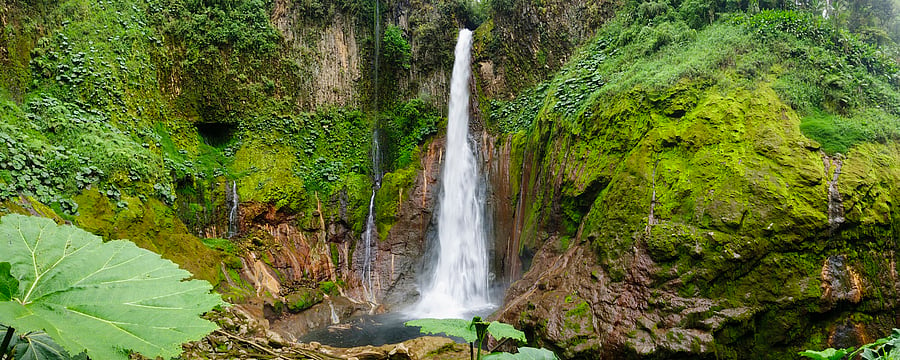
Do not change the sheets every day. Do not send the towel to the laundry. Please, please do not switch on all the lights after you are done with the turndown. If the tap water is good enough, do not leave plastic water bottles on the table. Do not print the bill, email it to me.”
Before I check into a hotel, I spew the ‘10 commandments’ (sometimes, more). Do not do this. Do not do that. Do not burden the world any further. Use the resources judiciously. The look on the spruced hotel front desk staff ranges from sudden surprise to big smirk to utter disdain, sometimes even an appreciative nod. “No one says such things,” is the commonest refrain. Perhaps, I am an ‘alt-traveller’. But every time I step into a new city, new country, I have visions of an impending apocalypse — no water, no trees, parched earth, islands vanishing into sea, very few animals. Just plastic everywhere. And tourists buying fresh air for the price of gold in ritzy shops. Pessimism is not my gift, but if we do not switch to sustainable tourism, there will be nowhere to travel to.
Thankfully, nations and hotels are embracing sustainable tourism more than ever before. Here are a few countries that take into account the impacts of tourism and explore how to minimise or eliminate the harmful ones. Here, systems are in place to ensure that tourism is done right to keep beautiful places beautiful. Not only for the present, but for all future tomorrows.
Pursuit of happiness in Bhutan
This little pretty country measures its wealth in happiness. There’s no Gross National Product, it is Gross National Happiness. White monasteries. Monks in red robes. Purple jacaranda. And Tiger’s Nest, an edge-of-the-cliff monastery that is on every trekker’s to-do list. Bhutan is a tourist’s delight. To curb the influx of tourists, Bhutan has adopted a ‘high value with low impact’ model of tourism. The entry requirements are very strict — all tourists must be with an approved tour operator and pay a daily tariff, which is considered as ‘sustainable tourism’ royalty and used towards the country’s free healthcare and education, as well as the building of tourism infrastructure.
Norway, a sustainability pioneer
Norway tops the world’s list in happiness index, and it has pioneered sustainable tourism methods. ‘Powered by Nature’ is the country’s official tourism slogan. In 2007, the Norwegian government introduced ‘Sustainable Norway 2015’ plan to increase awareness about sustainable tourism, environment, local communities and social matters. Under the guidance of Innovation Norway, several Norwegian tourist destinations such as Røros, Lærdal, Vega, Geilo, Trysil, Setesdal, Inderøy and Svalbard have been certified as sustainable.
One with the wild in Botswana
If there is one pretty place on the planet, it is Botswana, a landlocked African nation famed for its wildlife, fossilised river valleys and undulating grasslands. The land is blessed with some of the greatest wildlife spectacles on earth, and with dedicated conservation of biodiversity, Botswana is offering experiences that are either traditional or that suit the environment rather than forcing something just to cash in. Xudum Lodge in the Okavango Delta emphasises the importance of guests re-using and recycling at all times; and King’s Pool, a wilderness resort, runs entirely on solar energy.
Carbon-neutral Costa Rica
A jewel in the South American tourism crown, Costa Rica holds 5% of the planet’s biodiversity — a quarter of the country is still left as rainforest. As early as the 1970s, the country started forging a brand around eco-tourism, and is on target to be the first carbon-neutral country in the world by 2021. Not only has Costa Rica set up carbon-offset credit programmes, it has also formulated laws against the trade of shark fins, and abusing or abandoning pets.
Self-sufficient Maldives
Maldives is sinking. With no island measuring more than 1.8 metres above sea level, the country is the lowest on earth, therefore rising sea levels will be catastrophic. Doubting Cassandras predict that the island will vanish into the sea by 2050. Call it an instinct for survival or plain good tourism policy, Maldives has sustainable policies in place. Each resort generates its own power and water. The government has mandated that at least 30% of all daytime electricity has to be from renewable energy sources. Soneva Fushi, a luxury resort, has been fully carbon neutral since 2014. It recycles 90% of its waste, 100% of food waste, and has a mandatory 2% carbon levy on rooms.
Green & clean Slovenia
In 2016, Slovenia was the most sustainable country in the world, scoring highly on environment and climate, culture and authenticity, nature and biodiversity, among others. Ljubljana, the Slovenian capital, which was named Europe’s ‘greenest capital’, claims to be the first European city to move towards zero waste. The country has implemented the ‘Green Scheme of Slovenian Tourism’ in which 23 destinations, 14 places to stay, three parks and two agencies were granted a green label.